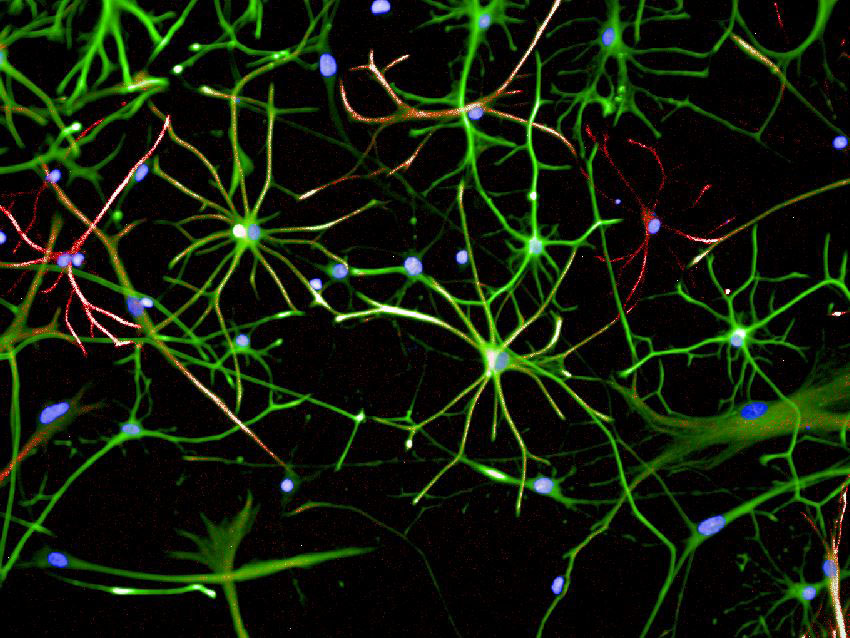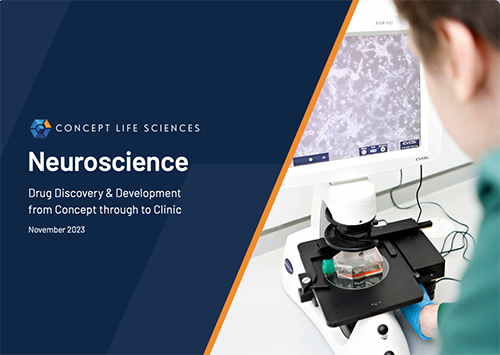Neuroscience
.jpg)
Leverage our expertise to drive your Neuroscience Drug Discovery Programs from Concept through to the Clinic. We have a strong background in neuroscience and extensive academic links to leading research groups in the field. We can help you understand your drug’s mode of action and test its efficacy across a range of translational models. We share our expertise and critical scientific insight, gathering robust data to drive confident decision making throughout your CNS drug discovery process.
Connected servicesMore informationSpeak to an expertConnected expertise and services
A more in-depth view
Our experienced neuroscience team offer consultation and specialist discovery services to support drug development in the field of Neurodegeneration and beyond, including cell-based assays and 3D CNS models. We also provide partnering Spatial Biology, Molecular Biology, Biophysics, Biomarker Analysis, as well as ADME & DMPK services, ensuring a comprehensive, tailored CNS program.
Our neuroscience expertise includes:
- Human iPSC-derived CNS Cells
- Rodent Primary CNS Cells
- CNS Cell Lines
- 3D Models
Human iPSC-Derived CNS Cells
Human iPSC-derived CNS cells are being increasingly utilised to drive drug discovery in multiple CNS disease areas, and particularly in the field of Neuroinflammation and Neurodegeneration. Unlike primary human CNS cells, human iPSC-derived CNS cells can be easily sourced and cultured at scale. Their gene expression profile and functional phenotypes closely align with that of their corresponding in vivo counterparts, making them the most physiologically representative model of human CNS cells that currently exists. This, combined with the possibility of applying gene editing technologies to these cells for the generation of lines carrying disease-associated mutations and isogenic control lines, and with the advent of complex co-culture systems, makes them an ideal tool for translational CNS disease modelling and drug discovery. We are experts at harnessing the power of iPSC-derived neurons, astrocytes and microglia for the generation of translational human data, and we can design assays tailored to your individual requirements.
Primary CNS Cells
Understanding the effects of candidate drugs on primary cells is likely a key step in your CNS drug discovery program. Unlike primary human CNS cells, primary rodent CNS cells can be sourced and cultured with relative ease. They are a biologically representative model of in vivo cell physiology, and as such they can be a valuable experimental platform to support the transition to in vivo studies, especially in rodent models. Primary cells can be sourced from wild-type animals, as well as genetically modified lines. We have extensive experience of isolating and culturing primary rodent CNS cells, and we can test them in relevant assays to help you understand the interaction between your drug and the nervous system. From rodent brain, we can purify and culture:
- Microglia
- Astrocytes
- Neurons
- Oligodendrocyte Precursor Cells (OPCs)
CNS Cell lines
Immortalised CNS cell lines can be a valuable and cost-effective model system in which to conduct primary screens of compound libraries. We have extensive experience of harnessing the versatility of cell lines for drug discovery applications and can design and execute assays tailored to your target and therapeutic modality. We offer a variety of readouts, including fluorescence, chemiluminescence and colorimetric assays, as well as High Content Imaging, targeted metabolomics, gene and protein expression quantification and live cell imaging.
Organotypic brain slice culture
Brain slice cultures contain and maintain all the relevant neuronal and glial cells, structure, and organisation of the brain in thick sections of cultured ex vivo tissue. This versatile 3D model offers a powerful translational link between in vitro and in vivo CNS studies in a variety of therapeutic areas. Exemplary applications of organotypic brain slices include:
- Neuroinflammatory Activation
- Inflammasome Activation
- Neurotoxicity
- Neuroprotection
- Developmental Myelination
We tailor the assay readouts to suit you. These can include immunohistochemistry-based analysis or gene expression studies using qPCR, RNAseq, RNAscope. This biological system is ideally suited for a low-throughput validation of your test compound in a complex multicellular CNS model.







.jpg)



